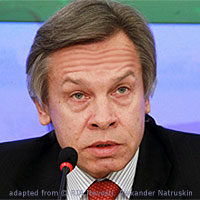Interfax: Assad overthrows Washington’s fixed idea – Russian lawmaker

MOSCOW. Jan 26 (Interfax) – Attempts to explain all of Syria’s current problems by President Bashar al Assad’s tenure hold no water and only reflect Washington’s obsession with the idea of Syrian president’s overthrow, chairman of the State Duma’s International Affairs Committee Alexei Pushkov said in remarks about U.S. Secretary of State John Kerry’s speech at the Davos international economic forum on Friday.
“His speech suggests that the U.S. administration is absolutely obsessed with the idea of removing Assad from office. Kerry spoke exceedingly at length about Assad’s desirable resignation and tried hard to convince all that if Assad leaves his post, all problems will be solved at one go. I think, this is pure propaganda, and I don’t think this sounds convincing in any way,” Pushkov said.
If the Syrian leadership is overthrown, Syria will “plunge into an abyss of absolute anarchy and chaos, because people wo are fighting against the current government, want to seize power, not to govern,” he said.
“Kerry argued that the highly intensive terrorist operations and the presence of 50,000 radical-minded Islamist militants in Syria is because Assad keeps attracting all radicals and terrorists like a magnet. This is not true,” Pushkov said.
“We can see the United States waging a war against radicals from the Taliban in Afghanistan. Assad is not to be found in Afghanistan, but the U.S. has been unable to defeat the Afghan Mujahedeen for 12 years now. We can see terrorists of all brands inundating Iraq since the U.S. overthrew Hussein. To claim that Syria is drawing radical-wing rebels linked to Al Qaeda because they are attracted by the magnet of Assad’s upcoming deposition is to distort the actual situation completely. They are there to seize power and to form a Shariah state, while Assad has nothing to do with this,” he said.
The problem is much deeper: Syria is increasingly becoming a country which is partly occupied by radical terrorist organizations through the fault of those who have been supporting, financing and arming the Syrian opposition since th beginning, he said.
Generally, Kerry’s speech at the Davos forum was a combination of reasonable and purely propaganda-motivated approaches, Pushkov said.
“The reasonable approaches boil down to the idea that the United Sates’ influence is not at all limited to its military power, that the U.S. is engaged in active diplomacy to settle the problem of Iran’s nuclear program and that the U.S. should not be viewed as a country that must tackle all problems with the use of weapons. Kerry made a point that the current American administration will lay the emphasis on diplomacy and political means, and that military force is not its chosen path,” he said.
This sort of rhetoric, said Pushkov, strongly differs from the rhetoric heard in Davos during George W. Bush’s tenure.
“Kerry clamed that there are countries and people who would like Americans to fight for them in other regions. He was directly hinting at Saudi Arabia which was spurring the U.S. to a war in Syria. But this is not the American choice, Kerry said. The U.S.’ choice is that of diplomacy and political methods. This, I think, was the strongest and most important part of Kerry’s speech,” said Pushkov.
